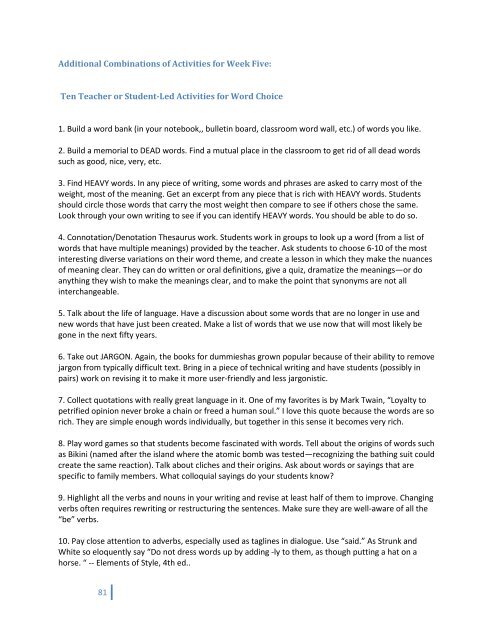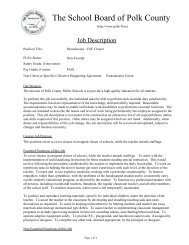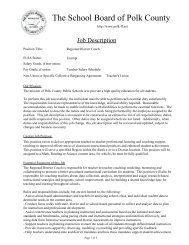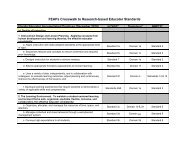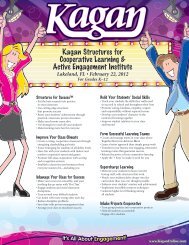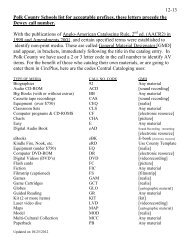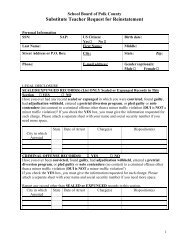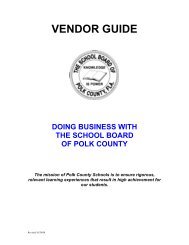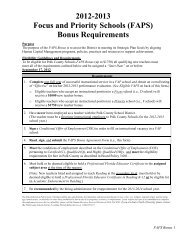Thirty Days to Unlock FCAT Writing Success - Polk County School ...
Thirty Days to Unlock FCAT Writing Success - Polk County School ...
Thirty Days to Unlock FCAT Writing Success - Polk County School ...
You also want an ePaper? Increase the reach of your titles
YUMPU automatically turns print PDFs into web optimized ePapers that Google loves.
Additional Combinations of Activities for Week Five:<br />
Ten Teacher or Student-Led Activities for Word Choice<br />
1. Build a word bank (in your notebook,, bulletin board, classroom word wall, etc.) of words you like.<br />
2. Build a memorial <strong>to</strong> DEAD words. Find a mutual place in the classroom <strong>to</strong> get rid of all dead words<br />
such as good, nice, very, etc.<br />
3. Find HEAVY words. In any piece of writing, some words and phrases are asked <strong>to</strong> carry most of the<br />
weight, most of the meaning. Get an excerpt from any piece that is rich with HEAVY words. Students<br />
should circle those words that carry the most weight then compare <strong>to</strong> see if others chose the same.<br />
Look through your own writing <strong>to</strong> see if you can identify HEAVY words. You should be able <strong>to</strong> do so.<br />
4. Connotation/Denotation Thesaurus work. Students work in groups <strong>to</strong> look up a word (from a list of<br />
words that have multiple meanings) provided by the teacher. Ask students <strong>to</strong> choose 6-10 of the most<br />
interesting diverse variations on their word theme, and create a lesson in which they make the nuances<br />
of meaning clear. They can do written or oral definitions, give a quiz, dramatize the meanings—or do<br />
anything they wish <strong>to</strong> make the meanings clear, and <strong>to</strong> make the point that synonyms are not all<br />
interchangeable.<br />
5. Talk about the life of language. Have a discussion about some words that are no longer in use and<br />
new words that have just been created. Make a list of words that we use now that will most likely be<br />
gone in the next fifty years.<br />
6. Take out JARGON. Again, the books for dummieshas grown popular because of their ability <strong>to</strong> remove<br />
jargon from typically difficult text. Bring in a piece of technical writing and have students (possibly in<br />
pairs) work on revising it <strong>to</strong> make it more user-friendly and less jargonistic.<br />
7. Collect quotations with really great language in it. One of my favorites is by Mark Twain, “Loyalty <strong>to</strong><br />
petrified opinion never broke a chain or freed a human soul.” I love this quote because the words are so<br />
rich. They are simple enough words individually, but <strong>to</strong>gether in this sense it becomes very rich.<br />
8. Play word games so that students become fascinated with words. Tell about the origins of words such<br />
as Bikini (named after the island where the a<strong>to</strong>mic bomb was tested—recognizing the bathing suit could<br />
create the same reaction). Talk about cliches and their origins. Ask about words or sayings that are<br />
specific <strong>to</strong> family members. What colloquial sayings do your students know?<br />
9. Highlight all the verbs and nouns in your writing and revise at least half of them <strong>to</strong> improve. Changing<br />
verbs often requires rewriting or restructuring the sentences. Make sure they are well-aware of all the<br />
“be” verbs.<br />
10. Pay close attention <strong>to</strong> adverbs, especially used as taglines in dialogue. Use “said.” As Strunk and<br />
White so eloquently say “Do not dress words up by adding -ly <strong>to</strong> them, as though putting a hat on a<br />
horse. “ -- Elements of Style, 4th ed..<br />
81


